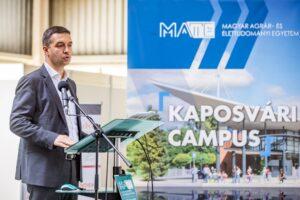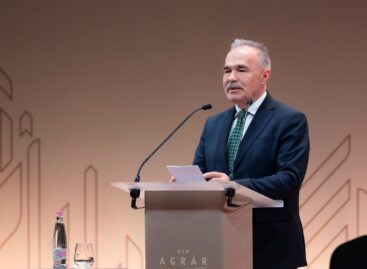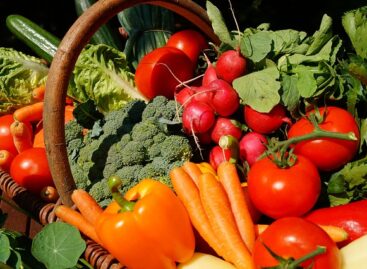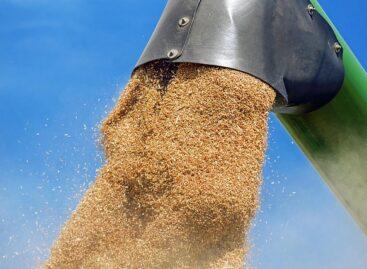We need lasting peace in agriculture
In recent years, agriculture has received intense attacks in Brussels, which offered a ceasefire to Hungarian and European agriculture three quarters of a year before the European Parliament elections. In agriculture, however, lasting peace, a predictable operating environment, professionalism, and decisions that take into account the realities of farmers are needed – said Zsolt Feldman in Kaposvár.

(Photo: AM/Tibor Vermes)
At the opening of the KÁN University Days event on Friday, the Secretary of State responsible for agriculture and rural development of the Ministry of Agriculture emphasized: in the past period, lack of professionalism and lack of scientific foundation has become a kind of trend in the mainstream media and on social platforms. In the context of the fight against climate change, the attack on the profession became general, agriculture became a kind of punching bag, a campaign was built in Brussels and a policy was pursued against animal husbandry, damaging its credit, he noted.
Food production and animal husbandry should remain at home
Zsolt Feldman stated: we do not want the vital food for European and Hungarian people to be produced in other parts of the world instead of Europe, we do not want European animal husbandry to be outsourced to the third world. Zsolt Feldman, in addition to the students of the agricultural vocational schools and others who attended the opening, also spoke to the students of the Hungarian University of Agricultural and Life Sciences about the fact that there is a very good perspective in agriculture, including animal husbandry, despite all the difficult circumstances. On average, a European person consumes 70 kilograms of meat and 236 liters of milk per year, this must be produced, and whoever is successful in animal husbandry faces a profitable and safe future, he said. Let’s fight against false stereotypes together, and it will be easier to operate an efficient and promising animal husbandry sector – said Zsolt Feldman. In his presentation on Livestock Breeders’ Day, he spoke about the fact that the schedule related to rural development tenders will be made public this fall, which includes which support schemes they want to announce by the end of 2024 from the second pillar of the common agricultural policy. About 1,500 billion forints are planned for investments until 2027, about 360 billion forints would be spent on the development of livestock farms, and they are also working to ensure that, in addition to the subsidies, the interest charges of the loans related to the investments can be settled at least in part, he added.
The actors of agriculture can certainly count on the resources provided by the Common Agricultural Policy until 2027
However, the effectiveness of the livestock industry does not depend on subsidies, Zsolt Feldman claimed. Rather, it depends on the cooperation skills and willingness of the sector players to innovate, and the agricultural administration can help with these. The advance payment of agricultural subsidies will start in mid-October, and the advance payment of the redistribution, dairy cow and ewes subsidy will also start this year, said the state secretary. Kaposvár mayor Szita Károly said at the KÁN opening that KÁN is one of the events that best represents the agricultural world in Hungary. It presents the values characteristic of the sector: the agricultural land that forms the basis of our lives, cooperation with nature, respect for tradition, modern and efficient farming in addition to ancient knowledge and knowledge, and the research work of the agricultural university, added the village leader. Csaba Gyuricza, university professor, rector of MATE emphasized: we are living in times when agriculture is becoming more and more fashionable, and today the question is not who can buy the food, but who can produce the food raw material, produce the food, and thereby strengthening the country’s sovereignty. In order to achieve this goal, middle and high-level professionals with the most up-to-date knowledge are needed,” he stated. KÁN was held for the first time a decade and a half ago in the county seat of Somogy. This three-day event, which started as a livestock exhibition and has now evolved into university days, will feature 100 exhibitors interested in agriculture this year, and the organizers expect 30,000 visitors to the programs.
MTI/AM
Related news
The amount of the compensation fund has been increased
🎧 Hallgasd a cikket: Lejátszás Szünet Folytatás Leállítás Nyelv: Auto…
Read more >The government is also helping micro and small farmers in agriculture with new, fixed 3% loans
🎧 Hallgasd a cikket: Lejátszás Szünet Folytatás Leállítás Nyelv: Auto…
Read more >Wheat producer price in Hungary decreased by a quarter
🎧 Hallgasd a cikket: Lejátszás Szünet Folytatás Leállítás Nyelv: Auto…
Read more >Related news
KSH: retail turnover in January exceeded the same period of the previous year by 3.5 percent and the previous month by 0.5 percent
🎧 Hallgasd a cikket: Lejátszás Szünet Folytatás Leállítás Nyelv: Auto…
Read more >A magyar csapat március 15-én lép színpadra a Bocuse d’Or Európai Válogatóján
🎧 Hallgasd a cikket: Lejátszás Szünet Folytatás Leállítás Nyelv: Auto…
Read more >REGIO Játék: 25.4 billion forints in sales and international opening
🎧 Hallgasd a cikket: Lejátszás Szünet Folytatás Leállítás Nyelv: Auto…
Read more >









